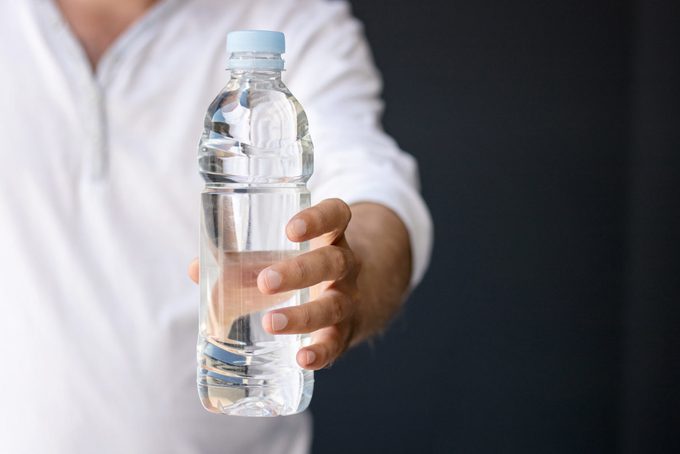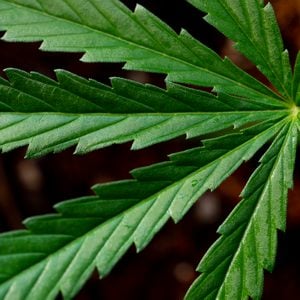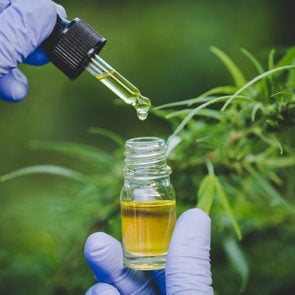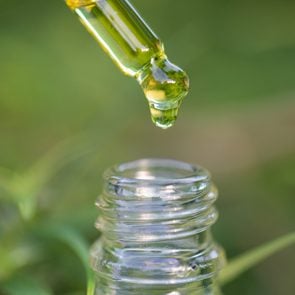What Experts Want You to Know About CBD Water
Updated: Mar. 05, 2021
CBD water has its own special properties, but can it work as well as other CBD products? Here's what to know before drinking it.
Should you drink CBD water?
CBD water is just one of many CBD products—from CBD gummies to eye drops to suntan lotion—that are available to buy and try. Like other forms of cannabidiol, CBD water has distinctive features in terms of how fast it works, how long the effect lasts, and what dose is most effective.
It’s important to note that CBD water contains relatively low levels of CBD, mostly around two to five milligrams per serving, depending on the brand. In comparison, CBD oil or gummies can have 10 to 20 mg per serving or more.
Light and air can degrade CBD, so a beverage sold in a clear bottle or one that is repeatedly opened and closed (exposing the CBD to oxidation) may contain even less of the compound.
In addition, how it’s manufactured matters. CBD water and other beverages have to be made with special nanotechnology that helps suspend the CBD in water, which can introduce some differences compared with other forms of CBD.
“CBD water has some pros and cons,” says Martin A. Lee, cofounder and director of Project CBD, a California nonprofit that promotes CBD research, and author of Smoke Signals: A Social History of Marijuana–Medical, Recreational, and Scientific. “If you’re going to infuse beverages with CBD—which is a perfectly legitimate way to take it—you have to use a certain method.”
Here’s what you need to know if you’re thinking of drinking CBD water.
What is CBD?
CBD is one of two main ingredients in both the marijuana plant and its cousin, the hemp plant. Unlike the other main ingredient, delta-9-tetrahydrocannabinol (THC), CBD does not produce a high. Marijuana tends to have more THC while hemp has more CBD. (Here’s more on the differences between CBD vs. THC.)
In the United States, most CBD comes from hemp which can be grown legally as long as it contains no more than 0.3 percent THC, as stipulated by the 2018 Farmers Bill. Hemp is also used to make rope, paper, carpets, and more. (Here’s what you need to know about CBD oil vs. hemp oil.)
Is CBD legal?
This is one of the more confusing areas of U.S. law. While 36 states have legalized CBD, the federal Drug Enforcement Administration still lists CBD and other derivates of marijuana as Schedule I controlled substances. The exception is hemp that contains no more than 0.3 percent THC. The National Conference of State Legislatures keeps a list of states where CBD is legal.
The Food and Drug Administration (FDA) has approved only one CBD-derived drug, Epidiolex, for rare forms of pediatric epilepsy. The consumer CBD market is still mostly unregulated. In general, your best bet when trying products is to work with a licensed medical dispensary or a medical professional, says Bonni Goldstein, MD, medical director and owner of Cannacenters, a medical practice in Los Angeles, and author of Cannabis is Medicine: How Medical Cannabis and CBD are Healing Everything from Anxiety to Chronic Pain.
Is CBD safe?
By and large, experts consider CBD to be very safe. At high doses, though, it can interact with many other drugs including blood thinners and common pain relievers. And pure CBD may require higher doses versus full-spectrum and broad-spectrum products, which contain other ingredients (more on this later). Always work with your doctor to make sure CBD doesn’t diminish the effect of any medications you’re taking. The National Library of Medicine keeps a list of all potential drug interactions.
Finally, look for American-grown CBD, which reduces the odds that a product is contaminated with toxic compounds. “You know better what’s in it,” says Dr. Goldstein.

What is CBD water?
CBD water is just one product in the gigantic CBD beverages industry which is expected to exceed $1.4 billion by 2023, according to market consultancy firm Zenith Global. You can also get CBD tea, CBD coffee, CBD sports drinks, and CBD sodas.
Combining CBD and water is a complicated process. “CBD is a fat,” explains Dr. Goldstein. “Fat mixed in water is like oil and water. They don’t mix.”
Enter nanotechnology which can structurally alter the fat molecules. The end result is formulated as a nanoemulsion. “You have to make the CBD compatible with water, otherwise the homogenized oil floats to the top,” explains Lee. “It requires a technological intervention . . . so the body perceives it as water.”
Although there’s not much research on CBD-infused beverages yet, this altering process may mean that your body absorbs the CBD faster so it starts working more quickly (in maybe as little as 20 minutes). The trade-off? The effect of CBD delivered in water may not last very long.
“If it acts quicker, it stops acting quicker, whereas edible or ingestible effects could last four hours easily,” says Lee.
And again, it’s important to note that CBD water contains relatively low levels of CBD, and it can vary depending on the brand.
Types of CBD water
Like any other form of CBD, whether it’s ingested (CBD capsules), inhaled, eaten (CBD edibles), or rubbed (CBD creams), CBD water comes in three main types:
Full-spectrum CBD: Contains all of the components of the hemp plant (Cannabis sativa), including CBD and also small traces of THC and plant compounds called terpenes.
Broad-spectrum CBD: Contains all of the components except THC.
CBD isolates: Contains only CBD.
ProjectCBD recommends opting for full-spectrum or broad-spectrum products as the ingredients tend to work together to create an additional effect, called the “entourage effect.”
CBD dosing
Dosing is important regardless of whether you’re eating CBD chocolate or vaping CBD oil. The problem is that, with the exception of FDA-approved Epidiolex, there are no real guidelines for dosage. Every individual has to figure it out for themselves. “There’s a range because we all metabolize differently,” explains Dr. Goldstein. Even doctors face challenges.
CBD has been studied as a treatment for sleep problems, anxiety, and pain in a wide range of doses, from 1 mg per day to 600 mg per day or more. Higher doses can lead to side effects like sleepiness (and can be expensive), so experts generally recommend using CBD at the lowest effective amount.
ProjectCBD recommends that you “start low, go slow.” You may hit the right dose the first time, or you may need to experiment or even work with a specialist.
How to buy CBD water
The quality of CBD water products varies widely, which means you’d be well advised to do your research before you buy. Finding a reputable company is key.
“Go with a company that has a website, ideally a phone number that you can call,” recommends Dr. Goldstein. “It’s very important that the company is transparent in terms of their extraction process and whether or not they add other ingredients to their products.”
Also important: Make sure you can see the certificate of analysis. This is a third-company verification that the ingredients are what the label says they are. Sometimes this is available online, sometimes you can scan the QR code on the package, and sometimes you have to ask.
And if you still decide to buy CBD water, be mindful that light and air exposure can break down CBD and potentially affect its medicinal properties, according to a study in the Journal of Pharmacy and Pharmacology. The study did not find temperature to have an effect.
(Got pain? Here’s a buyer’s guide on the best CBD oil for pain.)
The bottom line
CBD may offer some medicinal benefits. But drinking CBD water may yield very little, if any, due to the small amounts of CBD. The research is still limited on how exactly nanotechnology increases absorption in the body when it comes to CBD beverages. Also an unknown: whether it’s effective.
In the meantime, other CBD products like oils, capsules, and gummies, may serve as better alternatives to reap the therapeutic effects of CBD.
Next, here’s what you should know about CBD for weight loss.



